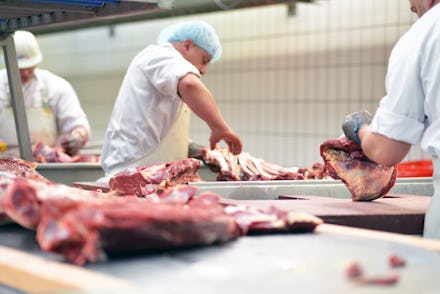Meat shortages are likely on the way — and fixing the issue could come at a deadly cost

President Trump signed an executive order on Tuesday for meat processing plants to remain operational even as the pandemic progresses. This happened shortly after John Tyson, whose family owns the country’s largest processor, Tyson Foods Inc., warned about a faltering food supply chain in an ad published in national newspapers. The US meat supply is indeed a problem, but one Tyson Foods had a hand in creating — and the company may endanger plant workers to fix it, Bloomberg reports.
Twelve slaughter plants have closed this month amid outbreaks among workers, dealing a major blow to slaughter capacity, according to Bloomberg. Meanwhile, meat prices are climbing, and analysts forecast shortages in the coming weeks.
In his executive order, Trump said meat processing plants counted as “critical infrastructure” and that his administration would ensure that they’d comply with federal health and workplace safety standards, per the New York Times. “The safety of our team members is our top priority,” Tyson wrote in an email Bloomberg. He described measures such as mandatory face coverings, temperature screenings, and social distancing measures, such as installing dividers.
But unions say the administration needs to secure more protections for employees in crowded facilities where they frequently work side-by-side, per the Times. The United Food and Commercial Workers International Union told the newspaper — which also ran Tyson’s ad—that COVID-19 has already killed 20 workers, at least.
As it turns out, though, Tyson Foods and other processing behemoths may be risking workers’ safety, and lives, to clean up a mess they helped make. Analysts blame decades of consolidation for the country’s imperiled supply chain. All told, Tyson Foods Inc., Cargill Inc., and JBS SA control two-thirds of the US’ beef, Bloomberg reports. (JBS and another meat giant, Smithfield Foods Inc., didn't respond to the outlet's requests to comment on consolidation, while Cargill turned them down.) Most of it undergoes processing in just a few dozen huge facilities. Chicken and pork are a similar story.
The high concentration of processors in a pretty small number of facilities means that when a few of them close, the supply chain has little recourse, per Bloomberg. In fact, a White House statement said shuttering a large beef processing plant can trigger the loss of more than 10 million servings of beef in a day.
Pre-COVID-19, consolidation in the U.S. meat and poultry processing industry won praise for allowing a few plants to churn out massive quantities of meat, which, in turn, allowed it to be sold at low prices, Bloomberg reports. But the pandemic has been a clarifying force, shedding a harsh light on the shortcomings of many of our existing systems. This is only the latest example.